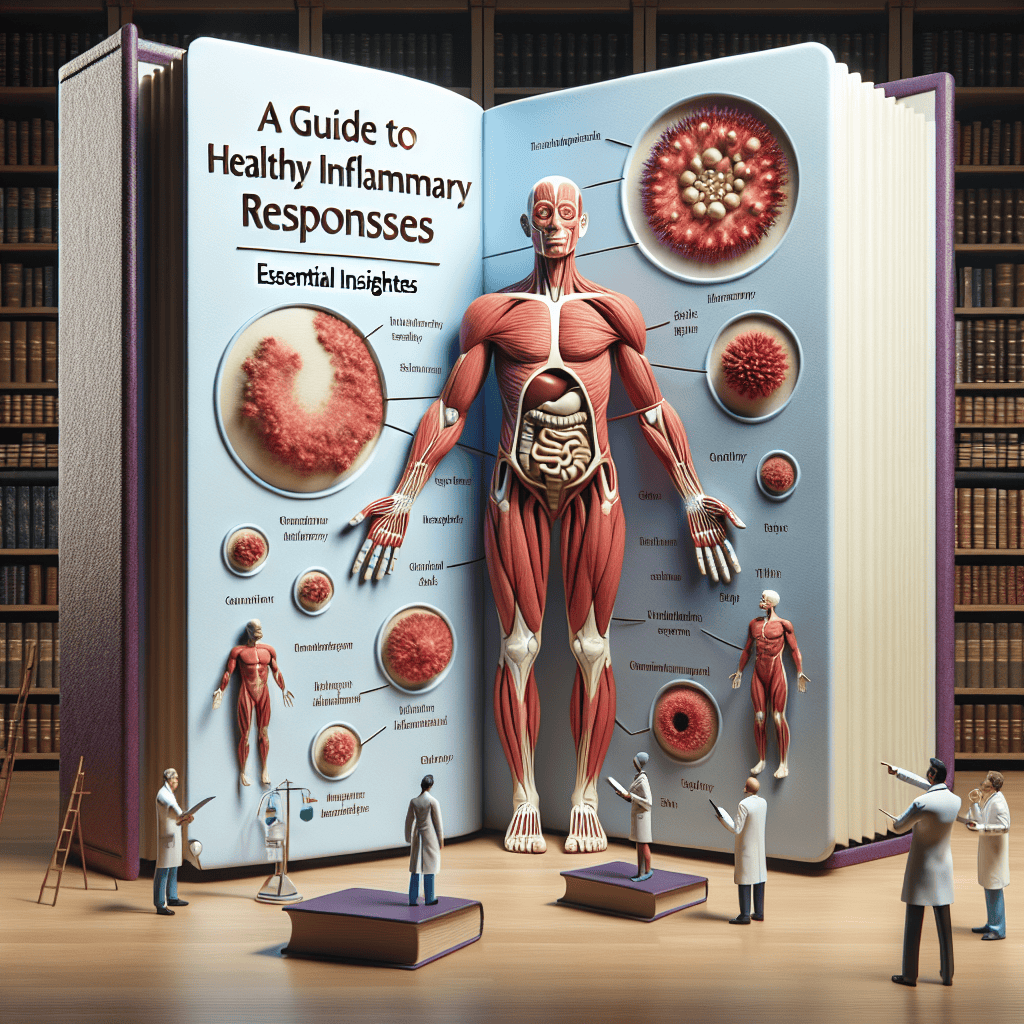A Guide to Healthy Inflammatory Responses: Essential Insights

Inflammation is a natural and essential part of the body’s immune response. It is the body’s way of signaling the immune system to heal and repair damaged tissue, as well as defend against foreign invaders such as viruses and bacteria. However, when inflammation becomes chronic, it can lead to a host of health issues. Understanding how to maintain a healthy inflammatory response is crucial for overall well-being. This guide delves into the intricacies of inflammation, offering insights into how to manage it effectively.
Understanding Inflammation: The Basics
Inflammation is a complex biological response of body tissues to harmful stimuli, such as pathogens, damaged cells, or irritants. It is a protective response involving immune cells, blood vessels, and molecular mediators. The function of inflammation is to eliminate the initial cause of cell injury, clear out necrotic cells and tissues damaged from the original insult and the inflammatory process, and to initiate tissue repair.
The Two Types of Inflammation
Inflammation can be classified into two main types: acute and chronic. Each type has distinct characteristics and implications for health.
- Acute Inflammation: This is the body’s immediate response to injury or infection. It is characterized by redness, heat, swelling, pain, and loss of function. Acute inflammation is usually short-lived, lasting only a few days. It is a necessary process that helps the body heal and protect itself.
- Chronic Inflammation: Unlike acute inflammation, chronic inflammation is a long-term condition that can last for months or even years. It occurs when the body continues to send inflammatory cells even when there is no outside danger. Chronic inflammation can result from a variety of factors, including persistent infections, autoimmune disorders, and prolonged exposure to irritants.
The Role of the Immune System
The immune system plays a crucial role in the inflammatory response. It is responsible for recognizing and responding to pathogens and other harmful substances. When the immune system detects a threat, it triggers an inflammatory response to protect the body.
Key players in the immune system’s response include:
- White Blood Cells: These cells are the body’s primary defense against infection. They are responsible for identifying and attacking foreign invaders.
- Cytokines: These are signaling proteins that regulate the immune response. They help coordinate the actions of immune cells and promote inflammation when necessary.
- Antibodies: These proteins are produced by the immune system to neutralize pathogens. They play a critical role in identifying and targeting specific threats.
Signs and Symptoms of Inflammation
Recognizing the signs and symptoms of inflammation is essential for managing it effectively. Common indicators of inflammation include:
- Redness: This occurs due to increased blood flow to the affected area.
- Heat: The inflamed area may feel warm to the touch due to increased blood flow.
- Swelling: This is caused by an accumulation of fluid in the tissues.
- Pain: Inflammation can cause discomfort and pain due to the release of chemicals that stimulate nerve endings.
- Loss of Function: Inflammation can lead to a temporary loss of function in the affected area.
Causes of Inflammation
Inflammation can be triggered by a variety of factors, including:
- Infections: Bacterial, viral, and fungal infections can all cause inflammation as the body attempts to fight off the invading pathogens.
- Injuries: Physical injuries, such as cuts, bruises, and fractures, can lead to inflammation as the body works to repair damaged tissue.
- Autoimmune Disorders: Conditions like rheumatoid arthritis and lupus cause the immune system to mistakenly attack healthy tissue, leading to chronic inflammation.
- Environmental Factors: Exposure to pollutants, allergens, and irritants can trigger an inflammatory response.
- Lifestyle Factors: Poor diet, lack of exercise, and stress can contribute to chronic inflammation.
Diet and Inflammation: What You Need to Know
Diet plays a significant role in managing inflammation. Certain foods can promote inflammation, while others can help reduce it. Understanding the impact of diet on inflammation is crucial for maintaining a healthy inflammatory response.
Foods That Promote Inflammation
Some foods can trigger or exacerbate inflammation in the body. These include:
- Processed Foods: Foods high in trans fats, refined sugars, and artificial additives can promote inflammation.
- Red and Processed Meats: These foods contain high levels of saturated fats and advanced glycation end products (AGEs), which can contribute to inflammation.
- Refined Carbohydrates: Foods like white bread, pastries, and sugary cereals can cause spikes in blood sugar levels, leading to inflammation.
- Fried Foods: Foods cooked at high temperatures can produce harmful compounds that promote inflammation.
- Excessive Alcohol: High alcohol consumption can lead to inflammation and damage to the liver and other organs.
Anti-Inflammatory Foods
Incorporating anti-inflammatory foods into your diet can help reduce inflammation and promote overall health. These foods include:
- Fruits and Vegetables: Rich in antioxidants and phytochemicals, fruits and vegetables can help combat inflammation. Berries, leafy greens, and cruciferous vegetables are particularly beneficial.
- Whole Grains: Foods like oats, brown rice, and quinoa are high in fiber and can help reduce inflammation.
- Healthy Fats: Omega-3 fatty acids found in fatty fish, flaxseeds, and walnuts have anti-inflammatory properties.
- Nuts and Seeds: Almonds, chia seeds, and sunflower seeds are rich in healthy fats and antioxidants.
- Herbs and Spices: Turmeric, ginger, and garlic have potent anti-inflammatory effects.
The Mediterranean Diet and Inflammation
The Mediterranean diet is often recommended for its anti-inflammatory benefits. This diet emphasizes whole foods, healthy fats, and lean proteins. Key components of the Mediterranean diet include:
- Olive Oil: A primary source of fat in the Mediterranean diet, olive oil is rich in monounsaturated fats and antioxidants.
- Fruits and Vegetables: The diet includes a wide variety of fruits and vegetables, providing essential vitamins and minerals.
- Whole Grains: Whole grains like barley, farro, and bulgur are staples in the Mediterranean diet.
- Fish and Seafood: Rich in omega-3 fatty acids, fish and seafood are consumed regularly.
- Nuts and Legumes: These provide plant-based protein and healthy fats.
Case Study: The Impact of Diet on Inflammation
A study published in the Journal of Nutrition examined the effects of a Mediterranean diet on inflammatory markers in individuals with metabolic syndrome. The study found that participants who followed the Mediterranean diet for 12 weeks experienced significant reductions in inflammatory markers, including C-reactive protein (CRP) and interleukin-6 (IL-6). These findings suggest that dietary changes can have a profound impact on inflammation and overall health.
Practical Tips for an Anti-Inflammatory Diet
Implementing an anti-inflammatory diet can be simple with a few practical tips:
- Plan Your Meals: Plan your meals around whole, unprocessed foods to ensure a balanced diet.
- Incorporate Variety: Include a wide range of fruits, vegetables, and whole grains to provide essential nutrients.
- Limit Processed Foods: Reduce your intake of processed and packaged foods high in sugar and unhealthy fats.
- Stay Hydrated: Drink plenty of water to support overall health and reduce inflammation.
- Practice Mindful Eating: Pay attention to hunger cues and eat slowly to promote digestion and reduce stress.
Lifestyle Factors Influencing Inflammation
Beyond diet, several lifestyle factors can influence inflammation. Understanding these factors and making positive changes can help manage inflammation effectively.
The Role of Exercise
Regular physical activity is one of the most effective ways to reduce inflammation. Exercise helps regulate the immune system and reduce the production of inflammatory markers. Benefits of exercise include:
- Improved Circulation: Exercise increases blood flow, delivering oxygen and nutrients to tissues and promoting healing.
- Weight Management: Maintaining a healthy weight reduces the risk of chronic inflammation associated with obesity.
- Stress Reduction: Physical activity releases endorphins, which can help reduce stress and improve mood.
- Enhanced Immune Function: Regular exercise supports a healthy immune system, reducing the risk of infections and inflammation.
Stress Management
Chronic stress can contribute to inflammation by triggering the release of stress hormones like cortisol. Managing stress is crucial for maintaining a healthy inflammatory response. Effective stress management techniques include:
- Meditation: Practicing mindfulness meditation can help reduce stress and promote relaxation.
- Deep Breathing: Deep breathing exercises can calm the nervous system and reduce stress levels.
- Yoga: Yoga combines physical movement with mindfulness, promoting relaxation and reducing stress.
- Time Management: Prioritizing tasks and setting realistic goals can help reduce stress and improve productivity.
- Social Support: Building strong social connections can provide emotional support and reduce stress.
Sleep and Inflammation
Adequate sleep is essential for regulating inflammation. Sleep deprivation can lead to increased production of inflammatory markers and weaken the immune system. Tips for improving sleep quality include:
- Establish a Routine: Go to bed and wake up at the same time each day to regulate your body’s internal clock.
- Create a Relaxing Environment: Make your bedroom a comfortable and calming space, free from distractions.
- Limit Screen Time: Avoid screens before bedtime to reduce exposure to blue light, which can interfere with sleep.
- Avoid Caffeine and Alcohol: Limit consumption of caffeine and alcohol, especially in the evening, to promote better sleep.
- Practice Relaxation Techniques: Engage in relaxation techniques like reading or taking a warm bath before bed.
The Impact of Smoking and Alcohol
Smoking and excessive alcohol consumption can contribute to chronic inflammation. Quitting smoking and moderating alcohol intake can significantly reduce inflammation and improve overall health. Benefits of quitting smoking include:
- Improved Lung Function: Quitting smoking can enhance lung capacity and reduce respiratory inflammation.
- Reduced Risk of Chronic Diseases: Smoking cessation lowers the risk of heart disease, cancer, and other inflammatory conditions.
- Enhanced Immune Function: Quitting smoking strengthens the immune system, reducing the risk of infections.
Case Study: Lifestyle Changes and Inflammation
A study published in the American Journal of Lifestyle Medicine examined the effects of lifestyle changes on inflammation in individuals with metabolic syndrome. Participants who adopted a comprehensive lifestyle intervention, including dietary changes, regular exercise, stress management, and smoking cessation, experienced significant reductions in inflammatory markers. These findings highlight the importance of a holistic approach to managing inflammation.
Supplements and Natural Remedies for Inflammation
In addition to dietary and lifestyle changes, certain supplements and natural remedies can help manage inflammation. These options can complement a healthy lifestyle and provide additional support for reducing inflammation.
Omega-3 Fatty Acids
Omega-3 fatty acids are essential fats with potent anti-inflammatory properties. They are found in fatty fish, flaxseeds, and walnuts. Omega-3 supplements, such as fish oil, can help reduce inflammation and improve overall health. Benefits of omega-3 fatty acids include:
- Reduced Inflammatory Markers: Omega-3s can lower levels of inflammatory markers like CRP and IL-6.
- Improved Heart Health: Omega-3s support cardiovascular health by reducing triglycerides and blood pressure.
- Enhanced Brain Function: Omega-3s are essential for brain health and may reduce the risk of cognitive decline.
Curcumin
Curcumin is the active compound in turmeric, known for its anti-inflammatory and antioxidant properties. Curcumin supplements can help reduce inflammation and support overall health. Benefits of curcumin include:
- Reduced Joint Pain: Curcumin can alleviate joint pain and stiffness associated with arthritis.
- Improved Digestive Health: Curcumin supports gut health by reducing inflammation in the digestive tract.
- Enhanced Immune Function: Curcumin boosts the immune system and helps protect against infections.
Ginger
Ginger is a natural anti-inflammatory agent that can help reduce inflammation and pain. It is commonly used in traditional medicine for its healing properties. Benefits of ginger include:
- Reduced Muscle Pain: Ginger can alleviate muscle pain and soreness after exercise.
- Improved Digestive Health: Ginger aids digestion and reduces inflammation in the gut.
- Enhanced Immune Function: Ginger supports the immune system and helps fight infections.
Green Tea
Green tea is rich in antioxidants called catechins, which have anti-inflammatory properties. Drinking green tea regularly can help reduce inflammation and promote overall health. Benefits of green tea include:
- Reduced Risk of Chronic Diseases: Green tea consumption is associated with a lower risk of heart disease, cancer, and other inflammatory conditions.
- Improved Brain Function: Green tea supports cognitive health and may reduce the risk of neurodegenerative diseases.
- Enhanced Metabolism: Green tea can boost metabolism and support weight management.
Case Study: The Effectiveness of Natural Remedies
A study published in the Journal of Alternative and Complementary Medicine examined the effects of curcumin and ginger supplements on inflammatory markers in individuals with osteoarthritis. The study found that participants who took curcumin and ginger supplements experienced significant reductions in pain and inflammation compared to those who took a placebo. These findings suggest that natural remedies can be effective in managing inflammation.
The Future of Inflammation Research
Research on inflammation is continually evolving, with new discoveries shedding light on the complex mechanisms underlying this essential biological process. Understanding the future directions of inflammation research can provide valuable insights into managing inflammation effectively.
The Role of Genetics
Genetic research is uncovering the role of genes in inflammation and how genetic variations can influence an individual’s inflammatory response. Understanding these genetic factors can lead to personalized approaches to managing inflammation. Key areas of genetic research include:
- Genetic Predisposition: Identifying genetic markers associated with increased risk of chronic inflammation and related diseases.
- Gene-Environment Interactions: Exploring how environmental factors interact with genetic predispositions to influence inflammation.
- Targeted Therapies: Developing targeted therapies based on an individual’s genetic profile to manage inflammation more effectively.
The Microbiome and Inflammation
The gut microbiome plays a crucial role in regulating inflammation. Research is exploring how imbalances in the gut microbiome can contribute to chronic inflammation and related diseases. Key areas of microbiome research include:
- Gut-Immune Axis: Understanding how the gut microbiome interacts with the immune system to regulate inflammation.
- Probiotics and Prebiotics: Investigating the potential of probiotics and prebiotics to modulate the gut microbiome and reduce inflammation.
- Microbiome-Based Therapies: Developing therapies that target the gut microbiome to manage inflammation and improve health.
Inflammation and Aging
Inflammation is closely linked to the aging process, with chronic inflammation contributing to age-related diseases. Research is exploring how managing inflammation can promote healthy aging. Key areas of aging research include:
- Inflammaging: Understanding the role of chronic inflammation in the aging process and its impact on health.
- Anti-Inflammatory Interventions: Developing interventions to reduce inflammation and promote healthy aging.
- Longevity Research: Exploring the potential of anti-inflammatory strategies to extend lifespan and improve quality of life.
Case Study: Advances in Inflammation Research
A study published in Nature Medicine examined the role of the gut microbiome in regulating inflammation and its impact on aging. The study found that specific gut bacteria were associated with reduced inflammation and improved health outcomes in older adults. These findings highlight the potential of microbiome-based therapies to manage inflammation and promote healthy aging.
The Future of Inflammation Management
The future of inflammation management lies in personalized approaches that consider an individual’s unique genetic, environmental, and lifestyle factors. Advances in technology and research are paving the way for more targeted and effective strategies to manage inflammation and improve overall health.
Conclusion: Key Takeaways for a Healthy Inflammatory Response
Maintaining a healthy inflammatory response is essential for overall well-being. By understanding the factors that influence inflammation and making positive changes to diet, lifestyle, and supplementation, individuals can effectively manage inflammation and reduce the risk of chronic diseases. Key takeaways from this guide include:
- Understand Inflammation: Recognize the signs and symptoms of inflammation and its impact on health.
- Adopt an Anti-Inflammatory Diet: Incorporate whole, unprocessed foods rich in antioxidants and healthy fats.
- Make Lifestyle Changes: Engage in regular exercise, manage stress, prioritize sleep, and avoid smoking and excessive alcohol consumption.
- Consider Supplements and Natural Remedies: Explore the potential benefits of omega-3s, curcumin, ginger, and green tea.
- Stay Informed: Keep up with the latest research on inflammation to make informed decisions about managing your health.
By taking a proactive approach to managing inflammation, individuals can support their immune system, promote healing, and enhance their overall quality of life.





